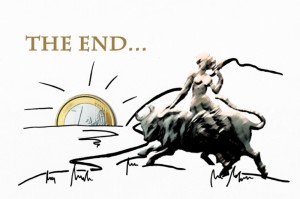When a convict takes his last walk down death row toward his execution, the prison guards call out across the corridors, “Dead man walking.” There is no shortage of people echoing this very call with regard to the euro these days. According to German detractors of the euro, the European currency has caused so much damage that putting it to death would be an act of corrective justice.
Merkel’s Germany has become unpopular thanks to the chancellor’s tough stance in the euro debate. The German-French friendship has cooled to somewhere just above freezing point. In Italy, Spain and Greece, you hear complaints about Germany’s egoism and obstinacy. U.S. Secretary of the Treasury Timothy Geithner has traveled to Europe more than ever before in recent months, always bearing the same message: Germans, save the euro, and you save yourselves.
At the upcoming annual meeting of the IMF in Tokyo, the groundwork has already been laid to put German policy on trial.
Paper into gold?
Can Chancellor Merkel get the Euro off death row? Should she? She should, if she could, but she can’t. Germany’s role in overcoming the sovereign debt crisis is grossly overestimated, and many assume falsely that the European Central Bank is able to turn worthless paper into gold.
The absence of a solution to the debt crisis lies in a dilemma that can be attributed to nearly every state in the Eurozone. Either Europe returns to the principles of Maastricht, which means strictly and uncompromisingly adhering to the principles laid out in that treaty; or the members of the Eurozone form a true financial union, in which both liability and oversight are situated in a central institution, which would mean ceding a core component of national sovereignty. There is no majority in favor of either of these paths in Europe. That is not Germany’s fault alone.
No amount of new loans, mantras repeated at EU summits, or appeals to “buy time” will get Europe out of this catch 22.
Good Guy – Bad Guy?
Neither will a promise to buy state bonds in unlimited amounts for an indefinite period of time from the supposed gold spinners inhabiting the European Central Bank tower in Frankfurt.
The differences of opinion between Mario Draghi and Jens Weidmann have turned out to exert a stabilizing influence on the system so far. Good Guy Draghi can always point out that Bad Guy Weidmann would refuse to go along with more extensive measures, such as purchasing state bonds. That allows him to seek compromises that preserve the European Central Bank’s reputation as a guarantor of stability. In the end, the positions taken by the president of the German Bundesbank also have an important political dimension for Germany.
Strategic retreat
Weidmann is an advocate for German interests, and in this way he ensures that the confused political dilettantes demanding a return to the Deutschmark only receive so much support.
Chancellor Merkel is limited to rearguard action in the European debate. This strategic retreat began at the most recent EU summit in Brussels.
What matters next is packaging the future resolutions in such a way that they are palatable for Germans. The rhetoric against a debt union is a good opening volley.

